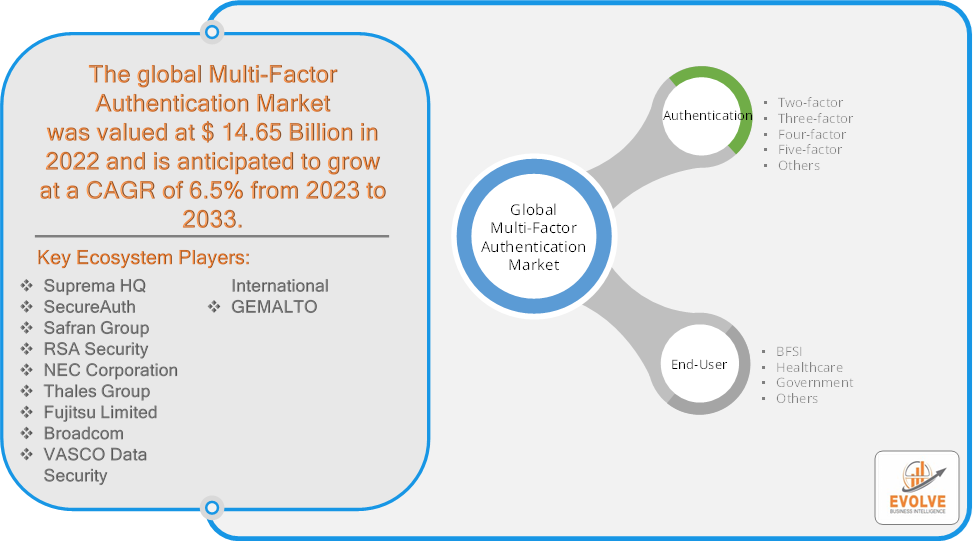Blog
Multi-Factor Authentication Market Estimated to Record 6.5% CAGR During Forecast Period

Evolve Business Intelligence has published a research report on the Global Multi-Factor Authentication Market, 2023–2033. The global Multi-Factor Authentication market is projected to exhibit a CAGR of around 6.5%during the forecast period of 2023 to 2033.
Evolve Business Intelligence has recognized the following companies as the key players in the global Multi-Factor Authentication Market: Suprema HQ, SecureAuth, Safran Group, RSA Security, NEC Corporation, Thales Group, Fujitsu Limited, Broadcom, VASCO Data Security International, GEMALTO
 More Information: https://evolvebi.com/report/multi-factor-authentication-market-analysis/
More Information: https://evolvebi.com/report/multi-factor-authentication-market-analysis/
Market Highlights
The Global Multi-Factor Authentication market is projected to be valued at USD 18.96 Billion by 2033, recording a CAGR of around 6.5% during the forecast period. The Multi-Factor Authentication (MFA) market focuses on technologies and solutions designed to enhance security by requiring users to provide two or more verification factors to gain access to a system, application, or data. MFA typically combines something the user knows (like a password), something the user has (such as a smartphone or security token), and something the user is (biometric identifiers). The market is driven by increasing cybersecurity threats, regulatory compliance requirements, and the growing adoption of digital transformation. Key segments include hardware tokens, software tokens, and biometric solutions. Major players in the market are constantly innovating to improve user experience and security.
The COVID-19 pandemic has led to supply chain disruptions leading to supply shortages or lower demand in the Multi-Factor Authentication market. The travel restrictions and social-distancing measures have resulted in a sharp drop in consumer and business spending and this pattern is to continue for some time. The end-user trend and preferences have changed due to the pandemic and have resulted in manufacturers, developers, and service providers to adopt various strategies to stabilize the company.
Segmental Analysis
The global Multi-Factor Authentication market has been segmented based on Authentication, End User
Based on Authentication, the market is segmented based on Two-factor, Three-factor, Four-factor, Five-factor. the Two-Factor Authentication (2FA) segment dominates due to its balance of enhanced security and user convenience, making it the most widely adopted method across various applications and industries.
Based on End Users, the market has been divided into the BFSI, Healthcare, Government, Others. the BFSI (Banking, Financial Services, and Insurance) sector dominates due to its high demand for robust security measures to protect sensitive financial data and comply with stringent regulatory requirements.
More Information: https://evolvebi.com/report/multi-factor-authentication-market-analysis/
Regional Analysis
The Multi-Factor Authentication market is divided into five regions: North America, Europe, Asia-Pacific, South America, and the Middle East, &Africa. North America holds a dominant position in the Multi-Factor Authentication Market. Consumers losing hundreds of dollars to online fraudsters and the surge in data theft are the main reasons behind North America’s multifactor authentication marketers of large identity crimes. Furthermore, the North American industry will gain from the presence of important actors and consumers in the United States, such as banks and large healthcare providers. The Asia-Pacific region has indeed emerged as the fastest-growing market for the Multi-Factor Authentication industry. From 2023 to 2030, the Asia-Pacific Multifactor Authentication Market is anticipated to expand at the fastest rate. Major Asian banks now have access to CREALOGIX’s service, which offers users a single application for both identity verification and banking. As part of a multi-factor authentication system, hardware devices no longer produce hardware tokens for one-time passwords (OTPs) for every operation. With soft tokens, all the security advantages of multifactor authentication are available in place of hard tokens.



